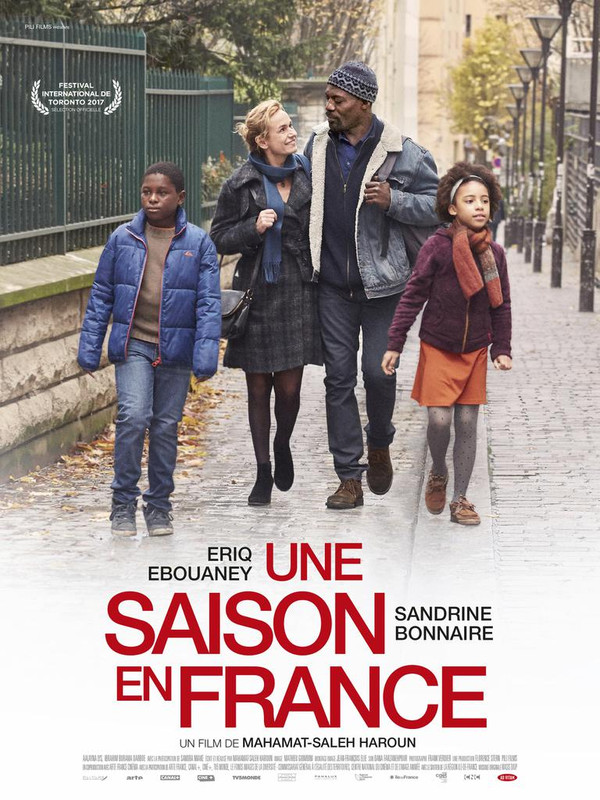Dir: Mahamat Saleh Haroun
It is easy, and probably comfortable, for us to view the current refugee crisis and the people seeking asylum in Europe in the abstract. When they are seen on a UKIP poster as an endless line of faceless people we don’t have to consider the individual stories that make up that line. I think a lot of people are afraid that if they did engage with those individual stories they would find that they empathise with some of them. That is very much the aim of A Season In France.
Abbas (Eriq Ebouaney) and his young son and daughter have escaped Central African Republic, but Abbas’ wife was killed by rebels before they could leave their home country. Now making their home in France, the children go to school while Abbas works at a market stall and has established a relationship with Carole (Sandrine Bonnaire). Abbas’ brother Etienne (Bibi Tanga) is also living and working in France, and the whole family is waiting to hear whether their asylum appeals have been granted. When they are denied life, inevitably, becomes even harder.
A Season In France has a difficult circle to square. It must at once be a specific story, taking us into the lives of Abbas, his family and Carole but it also will be asked to represent something larger, to speak for a wider refugee experience. That it manages this trick is one of its greatest achievements. While there was dialogue written, Haroun apparently likes to allow his actors to find natural unscripted moments within scenes, and we can feel the evidence of this balance throughout. This is especially clear in the performances of Aalayna Lys and Ibrahim Burama Darboe as Abbas’ children, Asma and Yacine. Neither of their performances appears scripted. Instead we seem to get a glimpse of kids being kids together, whether they’re toughing it out eating together in a cramped kitchen or they are finding a moment of escape as they help Carole celebrate her birthday.
Those moments of escape feel precious because there don’t seem to be many. Life is tough waiting to hear whether you’re to be allowed to make a new home when, in essence, you already have. The scenes at the court of asylum are wrenching - crowds of people being drip fed through to check their names against a list and discover their new status. We are left to imagine the details of what Abbas and Etienne experienced in their escape, but we see that Abbas still has nightmares about it and Etienne, having gone from being a teacher to working security, is clearly terrified of being returned. The point, ultimately, is that the fact they made the perilous and traumatic journey should tell us more than we often allow it to.
The naturalism that Mahamat Saleh Haroun captures in his sensitive work with the children is also reflected in the other performances. Eriq Ebouaney plays Abbas as a man remaining strong for his kids, for Carole, for Etienne, even as he inwardly accepts the inevitable. When those walls crumble and we see the vulnerability that lies just under that strong surface, when Abbas wakes from another dream about his wife, or cries with Carole, it’s deeply moving. Sandrine Bonnaire is typically excellent as Carole. She plays her as a woman without ulterior motives, who simply cares for Abbas and for his children. When we meet them the relationship is already established and we get a sense both of their chemistry and their affection for each other and the difficulty that Abbas has had in letting go of his wife. In a smaller role, Bibi Tanga brings warmth as Etienne. His story is just as affecting as anything else in the film, with a shocking sadness that intrudes without warning.
It would be easy for A Season In France simply to be depressing, and its conclusions are, but there is a lot of light let in to this story, a lot of warmth along the way. The film humanises and individualises a group of stories too often dismissed because of fear and prejudice. In that alone it is valuable, but it’s also an engaging, sometimes enraging, piece of drama in its own right.
★★★★
★★★★


No comments:
Post a Comment